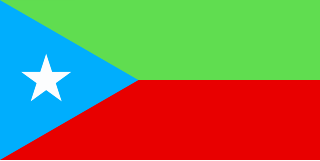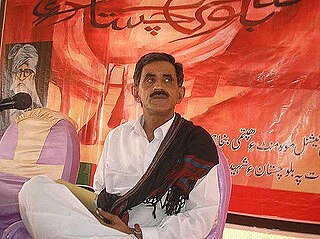Siddiq Baloch was a Pakistani journalist, and senior political economist.

The Insurgency in Balochistan is an insurgency or revolt by Baloch separatist insurgents and various Islamist militant groups against the governments of Pakistan and Iran in the Balochistan region, which covers the Pakistani province of Balochistan, Iranian province of Sistan and Baluchestan, and Balochistan of southern Afghanistan. Rich in natural resources, this is the largest, least populated and least developed province in Pakistan and Iran, and armed groups demand greater control of the province's natural resources and political autonomy. Baloch separatists have attacked civilians from other ethnicities throughout the province. In the 2010s, attacks against the Shia community by sectarian groups—though not always directly related to the political struggle—have risen, contributing to tensions in Balochistan. In Pakistan, the ethnic separatist insurgency is low-scale but ongoing mainly in southern Balochistan, as well as sectarian and religiously motivated militancy concentrated mainly in northern and central Balochistan.

The Fourth Balochistan Conflict was a four-year military conflict in Balochistan, the largest province of Pakistan, between the Pakistan Army and Baloch separatists and tribesmen that lasted from 1973 to 1977.

The Balochistan Liberation Army, is a Baloch ethnonationalist terrorist and militant organization based in Afghanistan. BLA perpetrates its terror activities from its safe havens scattered across Southern Afghanistan into the Pakistan's largest province of Balochistan, where it frequently carries out attacks against the Pakistan Armed Forces, civilians and foreign nationals.
The Baloch Students Organization is a student organisation that campaigns for the students of Pakistan's Balochistan Province. It was founded as a student movement on 26 November 1967 in Karachi and remains the largest ethnic Baloch student body in the country. It got divided due to ideological differences. BSO Pajjar and BSO Mohiuddin are affiliated with the parliamentary framework of Pakistan. Dr Allah Nazar, founder of pro independence wing, in 2002 while he was studying in college, created a breakaway faction — BSO–Azad — that advocated struggle for an independent Balochistan based on pre-colonial Baloch country. The Pakistani government banned the BSO Azad on 15 March 2013, as a terrorist organisation.
Baluch People's Liberation Front, also known as Baluch Awami Azadi Mahaiz or BPLF is a militant group formed by Mir Hazar Khan Marri, a prominent Baluchi leader in 1976, led by Sher Mohammad Marri.
Popular Front for Armed Resistance, or PFAR, was a terrorist outfit formed during the 1960s. The group is responsible for series of bomb blasts in Pakistan. PFAR aim was independence of Baloch region from Pakistan. There has been no accurate independent estimate of the size or strength of PFAR. Most of outfit's activists were trained in Afghanistan. For the outfit, Afghanistan was good place to obtain weaponry and others goods.
Abdul Raziq Bugti was a Pakistani politician from Balochistan province.
Abdul Hai Baloch, also known as Abdul Hayee Baloch, was a Pakistani social and political activist from Balochistan.
Hameed Baloch was a Baloch student and member of the Baloch Students Organization (BSO). He was arrested on 9 December 1979, while he was a student at Government Degree College Turbat, on charges of firing at a military officer from the Gulf state of Oman. The Omani military officer was recruiting Pakistani Baloch soldiers from Balochistan province to suppress the Dhofar Rebellion. Oman at the time was facing a Marxist–Leninist insurgency in its Dhofar province. Ever since Oman first took control of the enclave of Gwadar in Balochistan in the 18th century it had hired foot soldiers from the region to serve in the Sultan of Oman's Armed Forces. Oman ceded sovereignty over Gwadar to Pakistan in 1958.

The Baloch National Movement is a Baloch nationalist political organization which was led by Ghulam Mohammed Baloch, who served as the organizations's president until his murder in April 2009.

Ghulam Mohammed Baloch was a Baloch nationalist politician. At the time of his assassination in 2009, he was serving as the president of the Baloch National Movement, as well as the General Secretary of the newly formed Baloch National Front. He had earlier served as a chairman of the Baloch Students Organization. His dead body was discovered on 9 April 2009, five days after being detained by gunmen who were believed to be Pakistani Law enforcement officers. The killing led to riots around Balochistan. He had been detained several times in the past by Pakistani intelligence agencies due to his political activities.

Munir Ahmed Badini born in 1953) is a Pakistani novelist and writer. The recipient of the Pride of Performance, he primarily writes in Balochi and English languages.
Habib Jalib Baloch was a Baloch nationalist politician who served as a member of the Senate of Pakistan in 1997 and as the secretary general of the Balochistan National Party. In his student days, he served in several leadership positions of the Baloch Students Organization (BSO) as Chairman of BSO and also remained Editor of BSO Organs i.e"Girok", "Sangat" and "Bam"(1978–82).

Mir Noor-ud-din Mengal was a prominent Baloch Pakistani politician who played a significant role in Balochistan's political landscape for nearly four decades, from 1970 to 2010.

Abdul Malik Baloch is a politician and served as the 21st Chief Minister of Balochistan, Pakistan from 7 June 2013 to 23 December 2015. He was born in Turbat District, Makran and he is a member of the Hooth tribe.
Baloch Council of North America (BCNA) is a non-partisan, non-profit advocacy organization in the United States that seeks to "unite all Baloch people and secure Baloch rights, including the right of self-determination, within the Pakistani Federation". BCNA is one of several politically active organizations with roots in the Baloch diaspora, working alongside the Baloch Unity in Russia, and the Baloch Voice Foundation in France.

Karima Baloch, also known as Karima Mehrab, was a Baloch human rights activist from Balochistan, Pakistan. She was the first female chairperson of the Baloch Students Organization (BSO). She was included in the 100 Women List by the BBC in 2016, where she was identified as a political activist campaigning for the "independence for Balochistan from Pakistan."
Nasrullah Khan Zayrai, or Nasrullah Khan Bareach, is a Pashtun politician who is elected twice as a Member of the Provincial Assembly of Balochistan, from August 2018 to August 2023 and from May 2013 to May 2018. He remained in student politics and was one of the founding member of the Pashtoonkhwa Students Organization.
Yousuf Mustikhan was a Pakistani politician who was the president of the Awami Workers Party.








